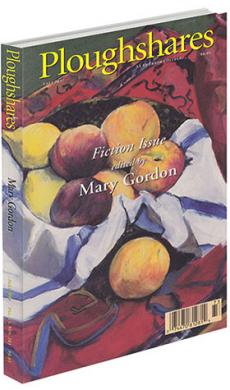rev. of Don’t Erase Me by Carolyn Ferrell
Don’t Erase Me
Stories by Carolyn Ferrell. Houghton Mifflin, $20.00 cloth. Reviewed by Elizabeth Searle.
“You ain’t no Body,” a young girl is told in Carolyn Ferrell’s powerfully compassionate first collection,
Don’t Erase Me. With a rich variety of voices, Ferrell lets her characters — most of them African-American girls and women — answer back resoundingly. Ferrell focuses on their struggle to survive, to avoid being “erased,” and she inhabits her characters fully, body and soul.
Many stories begin with the most basic forms of hunger. “Gain some weight,” the HIV-positive heroine of the title story advises herself. “. . . Make plantains. Molasses-fried pork chops. Cherry dump cake. Corncob supreme. Get rid of the diet pills. You were born fat and now the sickness makes you want more fat, more all over so you’ll stay longer.” Correspondingly, characters in other stories feel all but invisible in their harsh urban worlds, and sometimes seek attention through sex. A gay teenager meeting his first lover is told: “This is where your real world begins, man.” With similar intensity, the narrator of “Don’t Erase Me” recalls her need for her own first love: “When he wakes me up, it is all I can do not to squeeze him to death in love.”
Though most of the women and girls in the collection wind up disappointed by men, Ferrell never reduces her characters to victims and villains. In “Country of the Spread-Out God,” she adroitly shifts between the points of view of a teenage mother and her baby’s embittered young father. “You realize that you really are in the armpit of hell when you are waiting in Family Court,” he complains. Yet he adds, “Don’t misbelieve me. I love my kid. When I’m not with Sleepy, my kid’s on my mind like a crown. But the rule in life that I am busy learning right now is: Don’t let them see you sweat. Don’t let them in on your goodness.” His girlfriend sees that “goodness.” Still, she tells her side of their story with the matter-of-fact lack of illusions that characterizes Ferrell’s street-wise narratives: “And me, I have all these people in my house acting like animals, because everybody is selfish about their own something and they are all pissed to see all the other somethings that live in the world today . . .
and I think it’s a miracle that I can remember
good at all in the face of all this. Don’t you?”
To create such fully realized voices, Ferrell capitalizes on her keen ear and her playful sense of speech rhythms. Her characters come to life in dead-on dialogue (“Thanks Lorrie man I got a favor to ask you please don’t tell me no please man”) and intense inner monologues that often center on the frustration they feel at trying to express themselves (“I am in silent love in a loud body”).
Ferrell renders this frustration most painfully in the wrenching stories that close the collection, centering on daughters struggling with their white mothers. One daughter concludes, as she and her mother fight, “. . . and I knew it didn’t make any kind of sense . . . and you realized the dead fact that your mouth was really too small to allow the sentences to break out proper that belonged together.”
Despite the multiple odds against them, many of Ferrell’s characters do find ways to express themselves, often in secret. In the poignant and mordantly funny “Tiger-Frame Glasses,” an outcast girl tormented by bullies creates in her private notebook a “Stupendous” group of girls who form a “Helper Squad” and spend their days deciding “Who Should Benefit from Our Good Deeds?”
And, again, in the unforgettable “Don’t Erase Me,” the narrator faces down her mortality and her sense of worthlessness (“Am I invisible? And why you start walking faster every time you see me?”) with a new resolve, telling herself: “Rebirth yourself.” Working her way back from the day she receives her HIV diagnosis, she creates a searing chronicle of her life so far. Like many of Ferrell’s characters, she finds comfort among other women. She is especially drawn to a woman named Melody who lives on the street, telling historic stories “about black people,
her people.” Marveling at how Melody “doesn’t let nothing get in her way,” the narrator comes to this conclusion: “Maybe she knows she’ll always be in people’s minds, and maybe that keeps her going.”
In
Don’t Erase Me, Carolyn Ferrell has indelibly drawn vivid and compelling characters who will always be in the minds of her readers.
Elizabeth Searle is the author of My Body to You,
which won the Iowa Short Fiction Prize. Next February, Graywolf Press will publish her first novel, A Four-Sided Bed.

